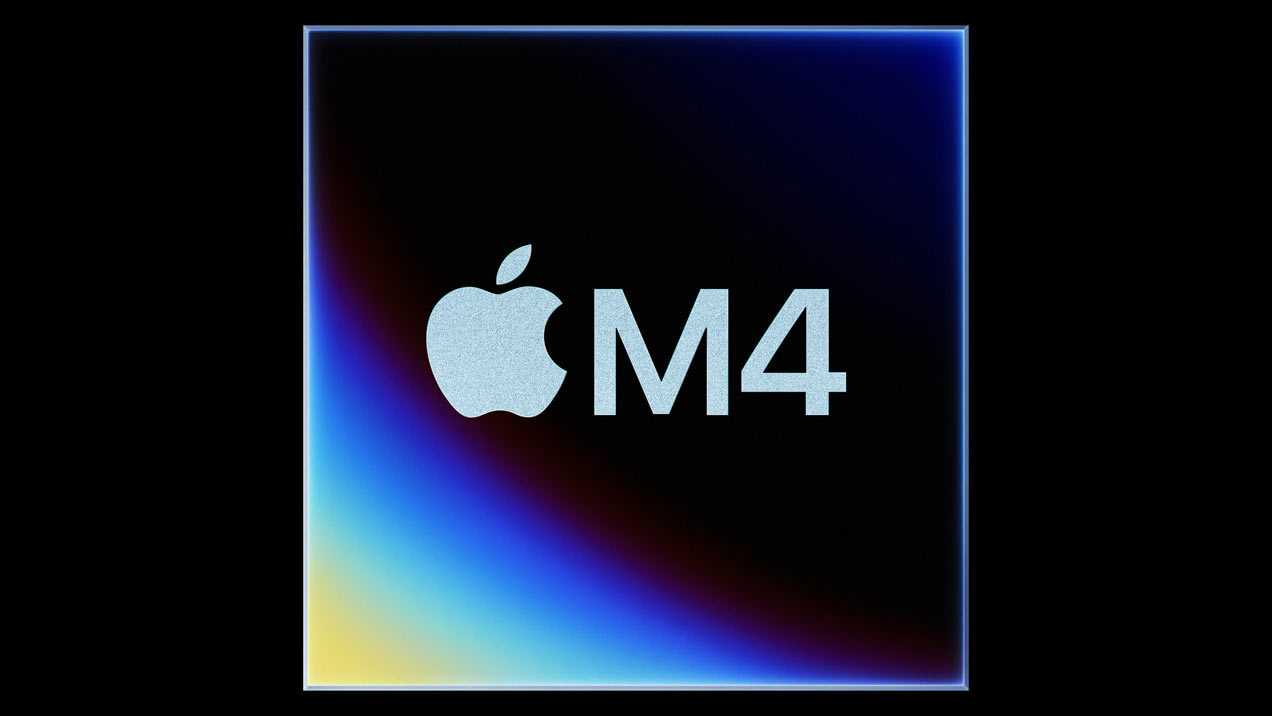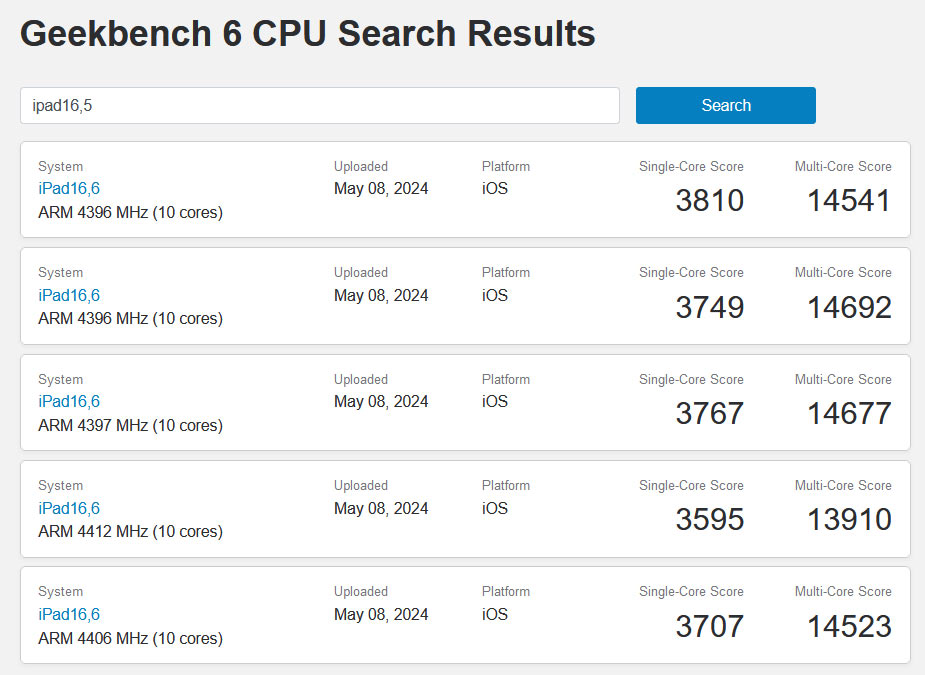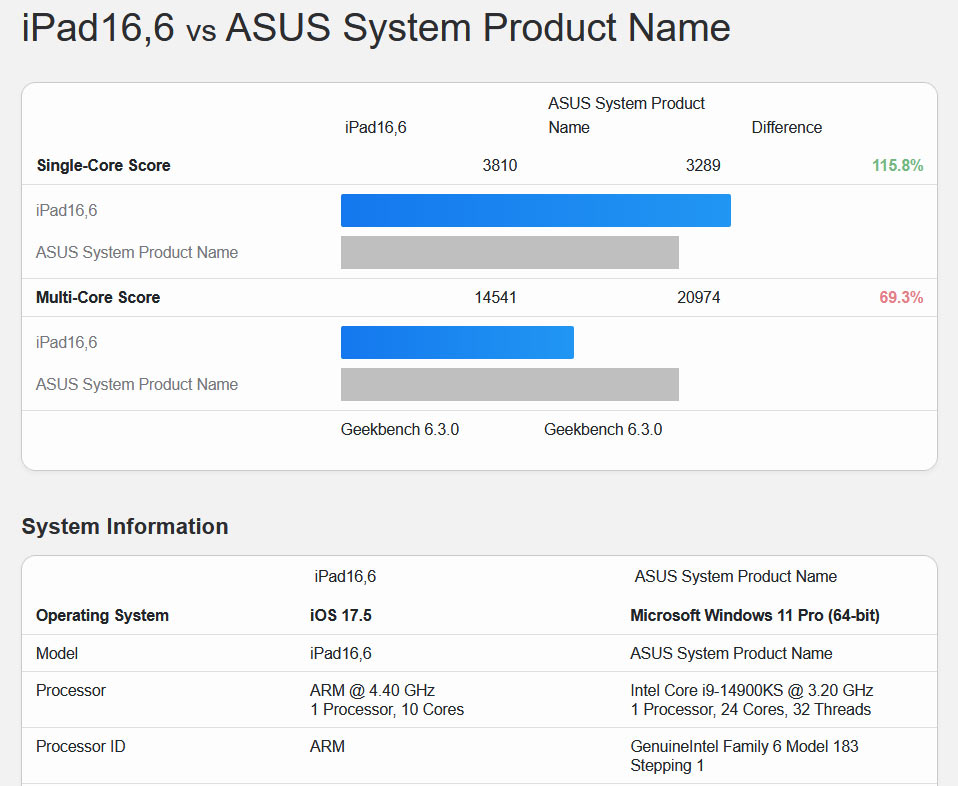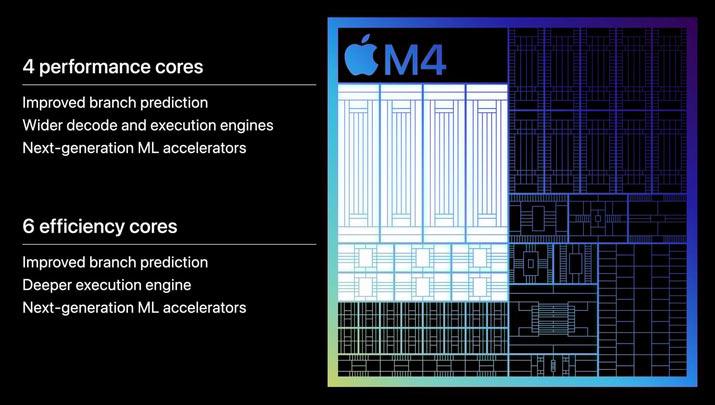Incredible Apple M4 benchmarks suggest it is the new single-core performance champ, beating Intel's Core i9-14900KS — results of 3,800+ posted
Compare that to a Core i9-14900KS scoring about 3,300 points.

Apple's M4 processors have become convincing leaders in the Geekbench single-core leaderboard. Several scores of roughly 3,800 points have appeared in the Geekbench online database over recent hours. This is significant as single-core benchmark scores of this magnitude put clear blue water between the M4 and Intel’s flagship Core i9-14900KS. A little Geekbench database checking shows that, in single-threaded tests, Apple's M4 outpaces Intel's power-hungry desktop champ by about 16%.


Since Apple's big launch event on Tuesday, we have seen Geekbench entries for iPads packing the new M4 chip turn from a trickle into a deluge. One thing most of the entries have in common is a great single-core CPU benchmark score. Multi-core benchmarks aren't nearly as interesting, with a total of four performance cores and six efficiency cores (10 cores) working together.
In some refreshed iPad Pro designs, the new Apple M4 mixes a 10-core CPU and 10-core GPU with a 16-core Neural Engine capable of 38TOPS. Built on a second-generation 3nm process, the SoC is also claimed to offer advances such as dynamic caching, hardware-accelerated ray tracing, and AV1 hardware acceleration.

Regarding CPU performance, Apple’s in-house tests showed the new top-end M4 chip with 28 billion transistors outpaces the M2 by 50%. Compared to an Asus Zenbook 14 OLED (UX3405MA) with an Intel Core Ultra 7 155H and 32GB of RAM, Apple said M4-powered devices could “deliver the same performance using just a fourth of the power.”
The big single-core gains on Geekbench could be fueled by newly added support for Scalable Matrix Extensions (SME) — some of the subtests, like object detection and image blurring, see massive gains (~200% for object detection). Support would imply that Apple is using an ARMv9 architecture, but this isn't yet confirmed. In either case, SME would give a strong boost to some of the tests that form Geekbench’s CPU suite, bumping up the overall single-core score. However, Geekbench 6 only recently introduced support for SME with version 6.3, and Intel's competing AMX isn't supported. That's largely because matrix workloads are a better fit for other forms of compute, like the NPU or GPU, than the CPU cores. As such, it isn't clear how much real-world benefit SME would deliver if run on the CPU cores, if any, in daily usage.
The remainder of the benchmark score indicates a roughly 3% increase in performance over the prior gen M3, but we'll have to wait for more detailed testing to determine if those are the result of IPC improvements or merely from frequency increases and/or cache clock changes.
We reported on Apple M4 Geekbench machine learning scores yesterday. The generational uplift between the M2 and M4 wasn’t huge according to these early results, with the new chip being only about 23% faster, despite Apple’s boastful AI acceleration claims.
Get Tom's Hardware's best news and in-depth reviews, straight to your inbox.

Mark Tyson is a news editor at Tom's Hardware. He enjoys covering the full breadth of PC tech; from business and semiconductor design to products approaching the edge of reason.
-
Dementoss That's all very well but, demanding applications are typically multi-threaded and, M4's multi-threaded score is rather less impressive.Reply -
kealii123 Am I reading this correctly? A tablet handily beats Intels flagship desktop CPU in single threaded?Reply
"But muh multicore" THIS IS A FREAKING TABLET VS A DESKTOP CPU THAT CONSUMES OVER 300 WATTS -
CelicaGT Reply
This says more about the i9 than the M4. AFAIK lesser Intel chips and AMDs stuff come closer in perf/W.kealii123 said:Am I reading this correctly? A tablet handily beats Intels flagship desktop CPU in single threaded?
"But muh multicore" THIS IS A FREAKING TABLET VS A DESKTOP CPU THAT CONSUMES OVER 300 WATTS -
JamesJones44 Reply
It only has 4 performance cores and 6 e cores. The fact that its performance is 69% of a processor that has 4 more performance cores and 12 more e cores is pretty impressive. If the M4 architecture can scale, an M4 Pro or Max could beat a 14900K in both single and multi thread benchmarks while using way less power to do so.Dementoss said:That's all very well but, demanding applications are typically multi-threaded and, M4's multi-threaded score is rather less impressive. -
ezst036 Everybody gawks at the performance.Reply
Not one of you wants to be trapped in that walled garden. -
magbarn Reply
Or get stuck paying SSD/Memory prices from over a decade ago...ezst036 said:Everybody gawks at the performance.
Not one of you wants to be trapped in that walled garden. -
hushnecampus Reply
This is the base M4. Compared to Intel's top of the range. One would assume the M4 Pro alone will stomp Intel, let alone the models up from that. Unless of course Intel bring something new out before the M4 Pro.Dementoss said:That's all very well but, demanding applications are typically multi-threaded and, M4's multi-threaded score is rather less impressive. -
hushnecampus Reply
I do.ezst036 said:Everybody gawks at the performance.
Not one of you wants to be trapped in that walled garden. -
CarlosO Well, it is all nice and dandy in the Apple world. At the end of the day, does such performance of the tablet for watching Youtube videos or browsing webpages, like the 95% of people will do with such tablet, which has hampered multitasking an limited access to limited on board space.... Any orher tablet for 1/3 can do almost the same thing. Apple has fallen into the loop. Their software garden is going to die off unless they open it to other insects. And selling these devices for such a premium prices, when you can buy a laptop and do some serious work.Reply